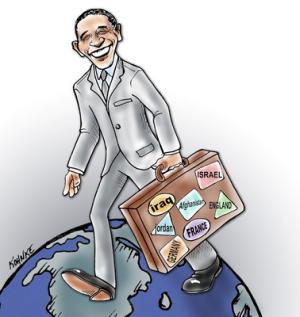
Symbolic policy with no strategy: newly-elected President Barack Obama developed a foreign policy program that spoke directly to people who were tired of George W. Bush’s war and terrorism strategies. One year after Obama’s electoral victory, America’s foreign policy program still lacks a clear direction and leaves many questions unanswered.
It all started so well on November 4th 2008. Barack Obama strode through a hail of photographers’ lights toward a brighter future. At least that’s how it seemed to a majority of people in the United States and Europe. A miraculous expectation of salvation flashed through Europe whenever the President made an appearance to satisfy the public’s messianic yearnings.
America is an amalgam of Christianity and The Enlightenment, of Christianity and the democratic striving toward a secular religion that would be a mixture of Republican Christianity and Democratic faith. In other words, America is a nation with the soul of a church. Obama is the high priest of that church and Europeans love him in that role.
Whatever the president proposed was popular. Obama developed a heartfelt foreign policy that spoke to a people who were tired of George W. Bush’s war and terror strategies. The new boss in the White House vowed to close the Guantanamo prison compound within a year.
Better relations with Russia
Besides that, he wanted to withdraw troops from Iraq, pacify Afghanistan through a mixture of social and military assistance, calm Iran down through negotiations, and bring Israelis and Palestinians together in peace. Along with all that, he also promised to improve relations with Russia and herald in the age of a nuclear weapons-free world. Isaiah 11:6 says, “The wolf also shall dwell with the lamb, and the leopard shall lie down with the kid; and the calf and the young lion and the fatling together; and a little child shall lead them.”
To accomplish this, Obama appointed many shepherds; that alone promised new hope. Hardly any president before him had lined up as many foreign policy heavyweights in one administration: from Hillary Clinton to Defense Secretary Robert Gates, from Richard Holbrooke to Security Advisor James Jones and on to Near East Special Envoy George Mitchell. But what have they been able to accomplish? Where can Obama hope to gain ground?
The first year report card is sobering. Up to now, it seems Obama is long on vision but short on strategy. He articulates his goals and initiatives passionately and eloquently, but there is never a Plan B; and that’s to say nothing of the mistakes he has made thus far.
First to the mistakes: shortly after taking office, he read the riot act to Israeli Prime Minister Benjamin Netanyahu concerning the construction of Israeli settlements in the West Bank. Relations with Israel have been impaired ever since. Then he announced an apparent change in that policy, thereby weakening Palestinian President Mahmoud Abbas, the only available Palestinian capable of negotiating. If Abbas falls, another chance for negotiations has been frittered away.
Sometimes gentle, sometimes tough
Obama has no answers to the question of what should happen next. His policy toward Iran is equally ambiguous. Tehran seems to be answering Obama’s offer for negotiations in Korean: it talks and negotiates gently one day, then abrasively the next. However, Iran is mainly playing for time and continues building nuclear weapons without interruption. What Obama will do if they succeed is anyone’s guess; there is no apparent concrete plan.
Among other things, Obama is relying on Russia. Under no pressure, he willingly gave up the Eastern European missile shield program to placate Moscow and gain Russian support against Iran. President Medvedev and Prime Minister Putin rubbed their hands and showed no inclination to reciprocate. What will happen if the Kremlin continues its cozy relations with Iran? Washington has no answer; perhaps General Stanley McChrystal does?
McChrystal has been warning the President for weeks about the ramifications of defeat in Afghanistan. He has requested more troops and clear policy directions, in vain. Obama has yet to give any answers. Meanwhile, the problem of Iraq has again popped up as the Muslim world soberly looks to Washington after Obama’s Cairo speech last June where big promises were made. Nothing has happened since.
Admittedly, it doesn’t have to remain so. Obama still has time to flesh out his symbolic policies with a clear strategy. Unless he succeeds, however, his presidency will end the same way Jimmy Carter’s did. For the West, that would be catastrophic.

Leave a Reply
You must be logged in to post a comment.